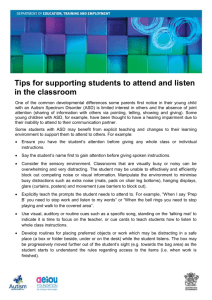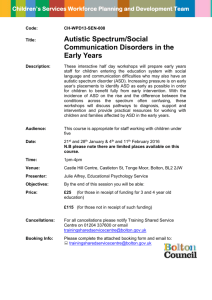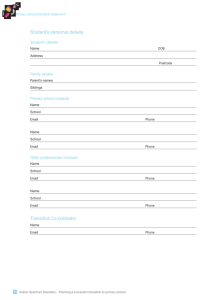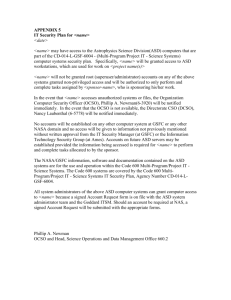2016 Gatlinburg Conference Poster PS-18
advertisement
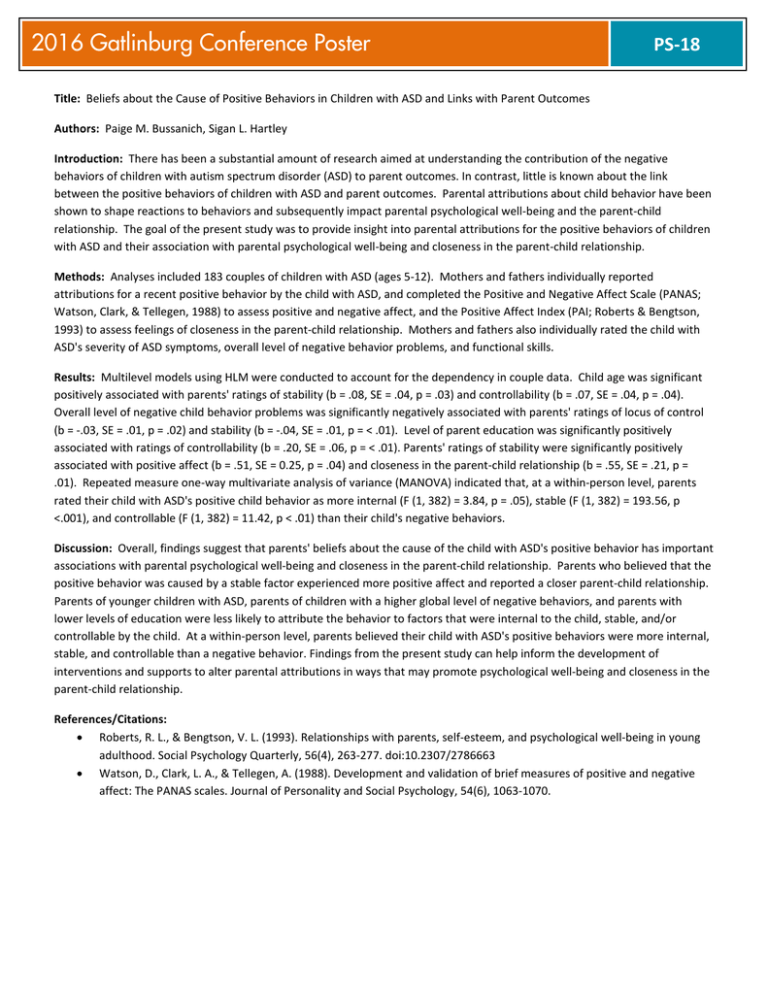
2016 Gatlinburg Conference Poster PS-18 Title: Beliefs about the Cause of Positive Behaviors in Children with ASD and Links with Parent Outcomes Authors: Paige M. Bussanich, Sigan L. Hartley Introduction: There has been a substantial amount of research aimed at understanding the contribution of the negative behaviors of children with autism spectrum disorder (ASD) to parent outcomes. In contrast, little is known about the link between the positive behaviors of children with ASD and parent outcomes. Parental attributions about child behavior have been shown to shape reactions to behaviors and subsequently impact parental psychological well-being and the parent-child relationship. The goal of the present study was to provide insight into parental attributions for the positive behaviors of children with ASD and their association with parental psychological well-being and closeness in the parent-child relationship. Methods: Analyses included 183 couples of children with ASD (ages 5-12). Mothers and fathers individually reported attributions for a recent positive behavior by the child with ASD, and completed the Positive and Negative Affect Scale (PANAS; Watson, Clark, & Tellegen, 1988) to assess positive and negative affect, and the Positive Affect Index (PAI; Roberts & Bengtson, 1993) to assess feelings of closeness in the parent-child relationship. Mothers and fathers also individually rated the child with ASD's severity of ASD symptoms, overall level of negative behavior problems, and functional skills. Results: Multilevel models using HLM were conducted to account for the dependency in couple data. Child age was significant positively associated with parents' ratings of stability (b = .08, SE = .04, p = .03) and controllability (b = .07, SE = .04, p = .04). Overall level of negative child behavior problems was significantly negatively associated with parents' ratings of locus of control (b = -.03, SE = .01, p = .02) and stability (b = -.04, SE = .01, p = < .01). Level of parent education was significantly positively associated with ratings of controllability (b = .20, SE = .06, p = < .01). Parents' ratings of stability were significantly positively associated with positive affect (b = .51, SE = 0.25, p = .04) and closeness in the parent-child relationship (b = .55, SE = .21, p = .01). Repeated measure one-way multivariate analysis of variance (MANOVA) indicated that, at a within-person level, parents rated their child with ASD's positive child behavior as more internal (F (1, 382) = 3.84, p = .05), stable (F (1, 382) = 193.56, p <.001), and controllable (F (1, 382) = 11.42, p < .01) than their child's negative behaviors. Discussion: Overall, findings suggest that parents' beliefs about the cause of the child with ASD's positive behavior has important associations with parental psychological well-being and closeness in the parent-child relationship. Parents who believed that the positive behavior was caused by a stable factor experienced more positive affect and reported a closer parent-child relationship. Parents of younger children with ASD, parents of children with a higher global level of negative behaviors, and parents with lower levels of education were less likely to attribute the behavior to factors that were internal to the child, stable, and/or controllable by the child. At a within-person level, parents believed their child with ASD's positive behaviors were more internal, stable, and controllable than a negative behavior. Findings from the present study can help inform the development of interventions and supports to alter parental attributions in ways that may promote psychological well-being and closeness in the parent-child relationship. References/Citations: • Roberts, R. L., & Bengtson, V. L. (1993). Relationships with parents, self-esteem, and psychological well-being in young adulthood. Social Psychology Quarterly, 56(4), 263-277. doi:10.2307/2786663 • Watson, D., Clark, L. A., & Tellegen, A. (1988). Development and validation of brief measures of positive and negative affect: The PANAS scales. Journal of Personality and Social Psychology, 54(6), 1063-1070.

